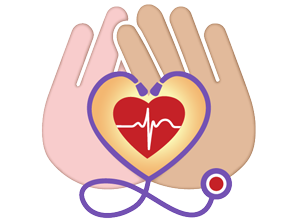My philosophy of education goes well beyond teaching textbook medicine. My aim is to teach not only patient care but also provider wellness. The evidence is clear—provider wellness and quality patient care are inseparable, and I choose to teach medicine with this in mind. While teaching evidence-based knowledge and motivating the learner to question and delve further, an equal goal of medical education for me is to support each learner’s discovery of their unique purpose as a physician. Much like parenting, whereby children learn more from what parents do than what they say, as a physician educator I place a great deal of value on modeling in practice. In doing so, my educational approach incorporates teachings of compassion, non-judgment, life balance, self-care, and a holistic view of child and family health, while at the same time empowering the learner with evidence-informed clinical knowledge.
Reflecting on my own beginnings, in 1992 I was in the first class at my medical school to learn exclusively by case-based learning. We were a small group of 30 who volunteered for this pilot program, and over the four years, never stepped foot in a lecture hall. Rather, we learned from the get-go by breaking into small groups, handed patient scenarios on paper, and guided by prompts that facilitated integrative learning of the foundations of medicine. This approach placed the doctor-patient relationship at the forefront of our learning, and patient-centered care became second nature for me. I carry this forward into my teachings today, including case-based learning, motivational interviewing, compare-and-contrast, and other methods that teach understanding and respecting the patient’s way of life as an essential doorway to healing. In my current studies of Integrative Medicine at the Andrew Weill Center for Integrative Medicine at the University of Arizona, I am gaining additional tools to incorporate into my teaching philosophy that emphasize supporting one’s innate ability to heal and transform toward a healthier lifestyle.
For the past eight years, I have designed and delivered medical curriculum to interns, residents, and fellows on rotation in Child Abuse Pediatrics. My motto is to offer “trauma-informed teaching” by educating learners about the “basic science of pediatrics” as defined in Dr. Jack Shonkoff’s 2012 landmark article in Pediatrics “The Lifelong Effects of Early Childhood Adversity and Toxic Stress.” According to Dr. Shonkoff, child health is multidisciplinary, impacted by biology, ecology, development, epigenetics, and neuroscience, and influenced by all experiences over the lifespan. In other words, we are never treating just a symptom or disease. Given how common childhood adversity is and its impact on health, practicing “universal trauma precautions” is fundamental to my teaching philosophy.
At the same time, knowledge of disease identification and treatment is paramount, and with that knowledge I aim to empower the learner. I believe trainees must come away from every educational experience with some clinical pearl that shifts them forward as a clinician.
In sum, my philosophy of education centers around four key components: Provider wellbeing, patient-centered holistic care, and evidence-informed knowledge for competency and empowerment. I hope my learners takeaway a better view of what it means to be a human being who is practicing compassionate, evidence-informed medicine.

